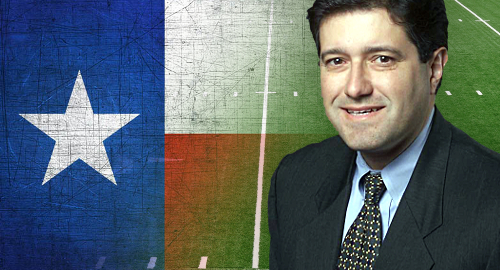 Texas has joined the parade of US states looking to regulate daily fantasy sports activity in 2017.
Texas has joined the parade of US states looking to regulate daily fantasy sports activity in 2017.
On Wednesday, State Rep. Richard Peña Raymond made good on last year’s vow to introduce legislation that would formally authorize DFS activity in the Lone Star state by classifying it as a game of skill.
HB 1457 would allow a “fantasy sports contest operator” to award cash prizes “based on the relative knowledge and skill of the contest participants and based predominantly on accumulated statistical results” of the actual athletes on the field.
HB 1457 would not allow fantasy contests that depended on scores, point spreads or “any single performance of an individual athlete in a single professional or amateur sports competition,” as well as any contest based on live pari-mutuel racing.
Texas residents would have to be 18 years of age or older to engage in fantasy sports contests. HB 1457 makes no mention of DFS license fees or taxes, which could prove problematic in convincing other legislators of the value of Raymond’s proposal.
The bill also contains no requirement for operators to segregate player deposits from operating capital, an omission that appears all the more glaring given Wednesday’s confirmation of the bankruptcy of Fantasy Aces due to an estimated $1.3m in misallocated (aka stolen) player funds.
The bill’s provisions would take effect immediately if approved by two-thirds of the members of each of the state’s legislative chambers. Should it be approved by less than two-thirds of legislators, the bill would take effect September 1, 2017.
Raymond’s bill attempts to counter state Attorney General Ken Paxton’s January 2016 nonbinding opinion that DFS is “prohibited gambling” under Texas law, which bars betting on events determined “solely or partially by chance.” Paxton rejected the notion that DFS was entitled to a skill-game exemption based on his view that this applied only to the “actual contestants” involved in the game.
FanDuel chose to stop offering real-money DFS contests in Texas not long after Paxton issued his opinion, but DraftKings chose to remain and litigate based on its belief that DFS was “perfectly legal under Texas law.” Yahoo and Fantasy Draft also continue to operate in the state.
There’s no question that Texas formally welcoming DFS would be a welcome boost to FanDuel’s sagging bottom line – and by extension, to DraftKings, since the companies are in the process of merging. FanDuel reportedly relied on Texas for as much as 8% of its revenue before it decided to get outta Dodge.





